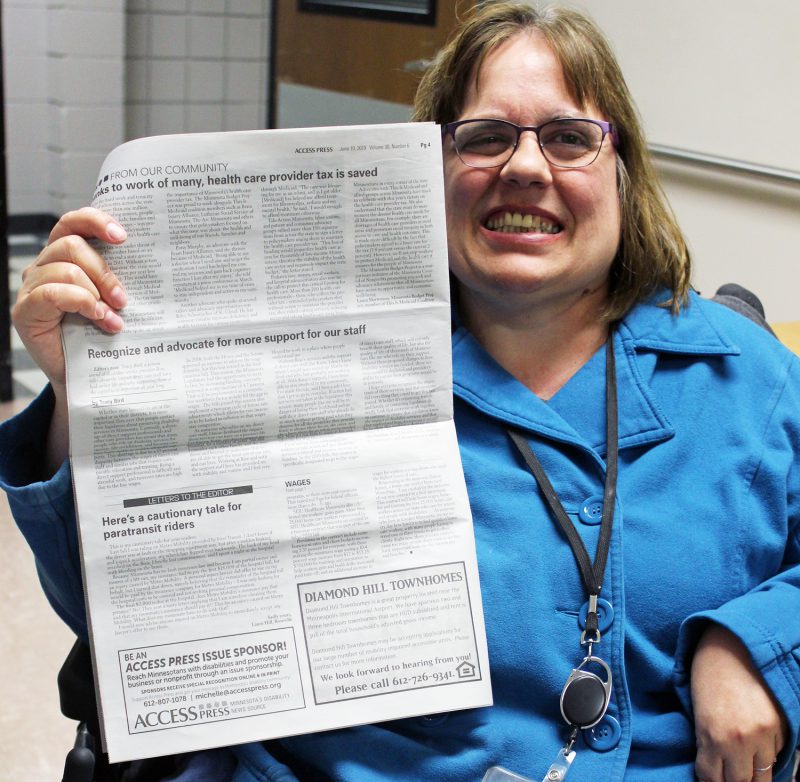Note: Tracy Bird is a data entry clerk who works at Rise Spring Lake Park. This article was originally published in the June issue of Access Press – Minnesota’s Disability Community News Source.
By Tracy Bird
Whether state lawmakers are at the Minnesota State Capitol or in their districts, it is more important than ever that people contact their representatives about preserving disability services in Minnesota. Currently, a shortage of direct support professionals and other care providers has meant that many people who rely on disability services for income, life enrichment, and housing care have been unable to receive adequate supports.
The shortage is due to a 17 percent disparity between the wages of direct care staff and similar jobs that require comparable education and training. Being a direct support professional is difficult and stressful work, and turnover rates are high due to low wages.
In 2018, both the Minnesota House and Senate approved an increase to address the wage disparity, but this was vetoed in the final omnibus bill.
This session, the Minnesota Legislature had the opportunity to rectify this by increasing funding, currently proposed at a rate increase of 4.7 percent. That will be implemented as a competitive workforce factor to help fill the gap in wages.
The bills passed this session also implement a two-year cycle of future rate adjustments which allows for rate increases to be linked to inflation so that wages stay completive.
As someone who relies on my direct care staff, I know firsthand the impact these services can have on a person’s life. I’ve known Katie Whiteford, my direct support professional at Rise, for a number of years. She and I consider each other family, and she goes above and beyond to make sure that we are all able to get the most out our jobs and our lives.
Working at Rise and with the support staff here has provided me with stability and routine and I feel very blessed to work in a place where people understand me. Without Rise’s service and the support of direct care professionals like Katie, I don’t know where I would have ended up. Maybe in dead-end jobs, but probably not working at all.
With Katie’s support, I have been able to stay involved in my community, I’ve made friends, and I have a job I love that I get to go to everyday. If action had not been taken in the legislature this session, many people like me would be in danger of losing their livelihood and so will their direct care staff who already do so much without getting paid what they deserve for all the positivity they provide. Katie is always there for me, she cares, and she’s been there for us when we’ve needed her. Now it’s our turn to support her and advocate for this rate increase.
I was among those who urged lawmakers to take action and give disability services a critical and overdue increase in funding. In the 2019 bills, this money is specifically, designated to go to the wages of direct care staff, which will not only benefit their quality of life, but also the quality of life of thousands of Minnesotans like me who rely on their support.
Without these proposed changes to how disability services are funded, these services would be depleted and providers’ ability to sustain their programs would be in jeopardy.
I hope everyone recognizes the importance of these services, and that everyone did everything they could to get this bill passed — whether it’s organizing friends and family, or contacting legislators directly.
I ask that everyone work together to ensure that legislators know the impact of disability services and that they understand how devastating it would be to allow this workforce shortage to continue.
If we do not continue to prioritize this funding, it will hurt both the disability community, and Minnesota as a whole.
This article appears in the September 2019 issue of the Rise Reporter.




